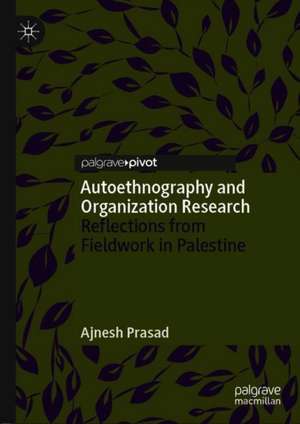Autoethnography and Organization Research: Reflections from Fieldwork in Palestine
Autor Ajnesh Prasaden Limba Engleză Hardback – 25 ian 2019
Preț: 449.35 lei
Nou
Puncte Express: 674
Preț estimativ în valută:
85.99€ • 88.84$ • 71.53£
85.99€ • 88.84$ • 71.53£
Carte tipărită la comandă
Livrare economică 19 martie-02 aprilie
Preluare comenzi: 021 569.72.76
Specificații
ISBN-13: 9783030050986
ISBN-10: 303005098X
Pagini: 93
Ilustrații: VII, 109 p. 1 illus.
Dimensiuni: 148 x 210 mm
Greutate: 0.3 kg
Ediția:1st ed. 2019
Editura: Springer International Publishing
Colecția Palgrave Pivot
Locul publicării:Cham, Switzerland
ISBN-10: 303005098X
Pagini: 93
Ilustrații: VII, 109 p. 1 illus.
Dimensiuni: 148 x 210 mm
Greutate: 0.3 kg
Ediția:1st ed. 2019
Editura: Springer International Publishing
Colecția Palgrave Pivot
Locul publicării:Cham, Switzerland
Cuprins
1. Introduction to Autoethnography.- 2. Autoethnography at Qalandiya.- 3. Autoethnography in an Ethnographic Encounter.- 4. Autoethnographic Writing.- 5. Teaching Autoethnography through Vulnerability.
Notă biografică
Ajnesh Prasad holds the Canada Research Chair at Royal Roads University in Victoria, British Columbia, Canada.
Textul de pe ultima copertă
As a method for empirical inquiry, autoethnography has gained much purchase among business school academics. This book offers exemplars of how autoethnography can be leveraged to study myriad organization and management phenomena. Drawing on his own fieldwork in Palestine, the author engages with several timely questions including: What are the ethical implications of pursuing organization research at neo-colonial spaces? How should we account for the 'Other' when studying in ideologically fraught sites? And, how should we write so as to capture the spirit of autoethnography? In sum, this seminal text highlights the benefits of autoethnography in business school research.
Caracteristici
First book devoted to the method of autoethnography targeted towards business school audiences Offers several empirical and grounded examples of how autoethnography is practiced Written by a leading qualitative methodologist in the field of management
